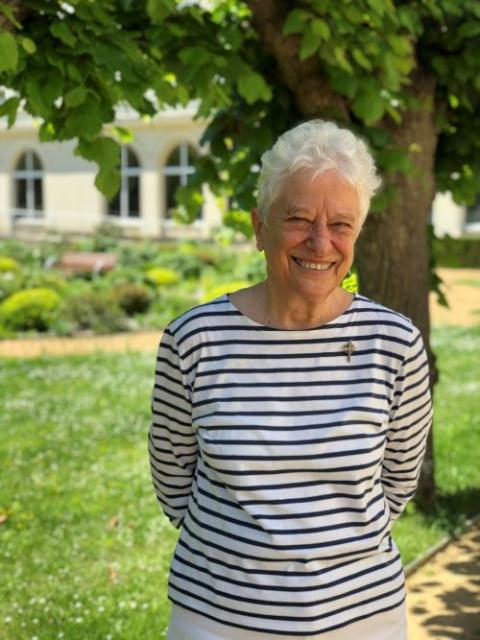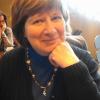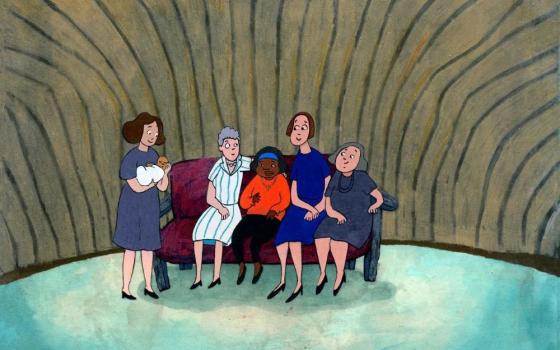Members of the Congregation of Our Lady of Charity of the Good Shepherd and lay members reflect on ways to pursue their mission together. About 70 people, including religious women, priests and laypeople, met in Angers, France, earlier this spring to discuss their mission. (Elisabeth Auvillain)
The Congregation of Our Lady of Charity of the Good Shepherd recently invited laypeople to reflect with them on ways to pursue their mission together. About 70 people, including religious women, priests and laypeople, met in Angers to discuss ways to move forward. Many young people, mainly students who live in a student home belonging to the sisters, came along. Participants also arrived from the Netherlands, Hungary, Belgium and throughout France.
The Good Shepherd sisters run shelters for mothers and children who need assistance, and this collaboration continues a process that started long ago.
"We have worked with laypeople for a long time," Good Shepherd Sr. Magdalena Franciscus told Global Sisters Report.
"Our life is different from laypeople's lives. But the charism of compassion exists in their hearts, too. We do not own it," Franciscus said. "Working together with laypeople will enable the congregation to maintain our missions following our spirituality."

Our Lady of Charity of the Good Shepherd Sr. Magdalena Franciscus (Elisabeth Auvillain)
As the Good Shepherd sisters are aging and recruiting fewer young members, "they would like to strengthen our partnership," said the president of the Lay Dominicans of the Province of France, Jean René Berthélemy.
During their March 28-30 meeting, participants read Pope Francis' October 2024 encyclical Dilexit nos on "the human and divine love of the heart of Jesus Christ."
"Some young participants had probably never read an encyclical letter, and it was important to show that God's love is addressed to our hearts, not only to our intelligence or souls. The incarnation of Christ means a lot," Berthélémy said.
She said that friends and lay associates care about Gospel values, are usually Christian, have been baptized and share a spirituality of mercy with the sisters.
"They reach out to people that sisters would not reach and are the presence of Jesus, the Good Shepherd. They make a commitment and are in touch with a community of sisters," Berthélémy said.
About half the French population say they believe in God, and about 12% go to church weekly.
One example of religious women depending on laypeople is Les Champs de Booz, created in 2023 by two Notre-Dame de Charité du Bon Pasteur sisters to help women asylum seekers in France, especially those most vulnerable to human traffickers. After the association started in 2003, sisters from 23 congregations joined their work.
Lay volunteers also joined, and the team now includes a former pharmacist and a former lawyer. The chairwoman is a medical doctor. As few sisters can help as much these days, the contributions of their lay members are more crucial than ever.
Advertisement
Although some sisters are sad to see their numbers going down, they will adjust, said Sr. Véronique Margron, president of the Conférence des Religieux et Religieuses de France.
"For young people, the specificity of religious life is not so clear," Margron said. "People are [eager] to make the lives of the most vulnerable easier and do not need to join a religious order to do so."
In addition to the decline in the sisters' ranks, France's extension of social services has gradually changed and reduced their roles.
Religious women, who founded several congregations in education and health, saw their roles reduced after the French state took over many of these services after World War II. However, congregations such as the Little Sisters of the Poor still operate health care facilities, although fewer nuns now work in health care facilities.
"Now that we live in a country where Christians are a minority, we have to reconsider what we do. We have to see the world as it is, answer the call the sisters have answered in a different way, adjusting to today's reality and our condition as laypeople," Berthélémy said.







